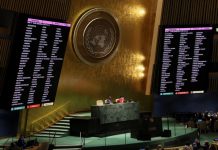US President Joe Biden has defended his decision to leave Afghanistan, rejecting the notion that the fall of Afghanistan to the Taliban was ‘inevitable’.
However, the US president did admit that it was “highly unlikely” that a unified Afghan government would control most of the territory.
His remarks came as the US and foreign forces leave Afghanistan, with the Taliban seizing key districts of the country with every passing day.
The US military has “achieved” its goals in Afghanistan – killing Osama bin Laden, degrading Al-Qaeda and preventing more attacks on the United States, Biden said in a White House speech on Thursday.
“We are ending America’s longest war,” he said, stating that the withdrawal would be completed by August 31 – earlier than his initial deadline of September 11. The Pentagon has said the exit is already 90 percent complete.
“The status quo is not an option,” Biden said of staying in the country. “I will not send another generation of Americans to war in Afghanistan.”
“The United States cannot afford to remain tethered to policies created to respond to a world as it was 20 years ago,” he said. “We need to meet the threats where they are today.”
Biden said the United States “did not go to Afghanistan to nation-build” and that the Afghan people alone should determine their future.
But he acknowledged the uncertainty about what that future would look like.
Asked if a Taliban takeover was “inevitable,” the president said: “No, it is not.”
The Taliban claim to have seized more than 100 out of nearly 400 districts in the country.
“The Afghan government… has to come together,” Biden said. “They clearly have the capacity to sustain the government in place. The question is, will they generate the kind of cohesion to do it?”
He expressed faith in Afghan forces, who for years have been trained by and received equipment from the United States, against the resurgent Taliban.
“Do I trust the Taliban? No,” Biden said. “But I trust the capacity of the Afghan military, who is better trained, better equipped and more competent in terms of conducting war.”
Biden, answering questions from reporters, said that Kabul falling to the Taliban would not be an acceptable outcome. He also pushed back against the notion that such a scenario was certain.
To be certain, the West hopes Taliban gains will be confined mostly to rural areas, with the Afghan government and its allies retaining control of the cities where much of Afghanistan’s population resides. And while the Taliban remain a major power in Afghanistan, the government’s supporters hope that Afghans will work out the Taliban role in the post-US Afghanistan power structure more through political than military means, partly through the inducements of international legitimacy, aid and other support.
Asked by a reporter whether rampant corruption within the Afghan government contributed to the failure of achieving the sort of stability that his predecessors and American military commanders envisioned, Biden didn’t exactly dismiss the notion. “The mission hasn’t failed — yet.”
And he flatly rejected comparisons with the US experience in Vietnam.
“The Taliban is not the North Vietnamese army,” Biden said. “They’re not remotely comparable in terms of capability.”
“There’s going to be no circumstance where you are going to see people being lifted off the roof of an embassy of the United States from Afghanistan,” he added. “It is not at all comparable.”
The Taliban, for their part, welcomed Biden’s statement.
“Any day or hour that US and foreign troops leave earlier is a positive step,” spokesman Suhail Shaheen told AFP.









